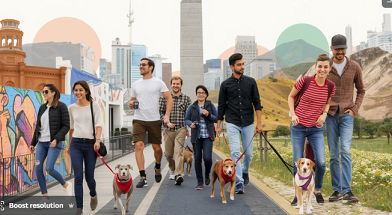Dog Walker Jobs in Argentina for Foreigners
Argentina is one of South America’s most pet-friendly countries, and its cities especially Buenos Aires—are full of beautiful parks, long walking trails, and dog-loving communities. As the number of pet owners continues to grow, so does the demand for reliable and caring dog walkers (paseadores de perros). For foreigners seeking flexible work opportunities, dog walking in Argentina offers a perfect blend of outdoor activity, companionship, and income generation.
This comprehensive 2025 guide, explores everything foreigners need to know about dog walker jobs in Argentina—including how to find work, legal considerations, typical pay, cultural expectations, and real-world experiences.
Overview of the Dog Walking Profession in Argentina
Dog walking is a respected and growing service industry in Argentina. In cities like Buenos Aires, Rosario, and Córdoba, it’s common to see professional walkers leading packs of 5–10 dogs on weekday mornings. These professionals serve busy working families, expatriates, and elderly pet owners who want their dogs exercised daily.
A dog walker (paseador de perros) is responsible for:
-
Walking dogs safely for scheduled durations (usually 30–60 minutes).
-
Ensuring socialization, hydration, and minor obedience reinforcement.
-
Picking up waste and keeping public spaces clean.
-
Reporting any health or behavioral issues to owners.
-
Occasionally feeding or grooming pets after walks.
The job may seem casual, but it requires trust, patience, and a genuine love for animals.
Dog Walker Jobs in Argentina for Foreigners
Why Argentina Is Ideal for Foreign Dog Walkers
Argentina’s relaxed labor culture, pet-friendly communities, and low entry barriers make it a perfect environment for foreigners seeking part-time or freelance work. Here’s why:
-
Pet Culture: Argentines treat dogs as family members. Many own more than one pet.
-
Urban Demand: In major cities, professionals work long hours and depend on walkers.
-
Accessible Entry: No formal degree or expensive certification is required.
-
Outdoor Lifestyle: Ideal for those who enjoy daily exercise and social interaction.
-
Flexible Schedule: Foreigners can combine walking jobs with language study or tourism.
-
Growing Industry: Pet-related services (walking, grooming, boarding) are expanding rapidly post-2023.
Common Work Locations for Dog Walkers
Buenos Aires
The country’s capital is the epicenter of dog walking culture. Neighborhoods like Palermo, Recoleta, and Belgrano are filled with pet owners and parks such as Parque Tres de Febrero or Plaza Las Heras where walkers gather daily.
Córdoba
Known for its peaceful suburbs and college population, Córdoba has a steady demand for part-time walkers who serve professors, students, and expatriate families.
Mendoza
Dog walking here often combines vineyard settings and mountain trails. Pet sitters and walkers work for rural estates, wineries, and tourist lodges.
Rosario
A riverside city with scenic walking routes. Dog walkers enjoy access to open spaces and a community of pet-friendly cafés.
Bariloche
For foreigners seeking mountain air and adventure, Bariloche offers part-time dog walking jobs during tourist seasons.
Legal Considerations and Work Eligibility
Foreigners planning to work as dog walkers in Argentina should understand the local employment landscape.
1. Visa and Work Permit:
-
Tourists can legally stay for 90 days but cannot officially work for registered companies.
-
However, many dog walkers operate independently or under informal agreements.
-
For longer stays, it’s better to obtain a temporary residence visa or student visa that allows self-employment.
2. Tax and Registration:
-
Freelancers can register as Monotributistas, a simplified taxpayer category for self-employed workers.
-
This gives access to health insurance (obra social) and legal invoicing (facturación).
3. Insurance and Safety:
-
Some professional agencies require dog walkers to carry liability insurance in case of injury or loss.
-
Independent freelancers typically handle risks personally, so it’s important to establish clear contracts with pet owners.
Dog Walker Jobs in Argentina for Foreigners
How to Find Dog Walking Jobs in Argentina
There are several paths for foreigners to enter the market, depending on your visa status, Spanish level, and preferred city:
-
Pet Care Agencies:
-
Companies in Buenos Aires and Rosario regularly hire part-time walkers.
-
These agencies handle scheduling, payments, and client acquisition.
-
Examples include local pet care collectives and walking networks.
-
-
Freelance and Word-of-Mouth:
-
Many walkers find clients through expatriate Facebook groups, WhatsApp communities, or referrals.
-
Trust grows quickly once you’ve worked for one satisfied client.
-
-
Pet Sitting and Walking Apps:
-
While Argentina’s pet tech industry is growing, platforms like Pawer, DogHero, and Petlover occasionally advertise opportunities for English-speaking walkers.
-
-
Hotels and Expatriate Networks:
-
Foreign guests and embassies often look for bilingual pet handlers.
-
Networking through cafés or hostels can lead to high-paying private clients.
-
Typical Daily Routine of a Dog Walker
A day in the life of a dog walker in Argentina is both structured and flexible:
-
7:30 AM – 9:00 AM: Morning pickup from clients’ homes.
-
9:00 AM – 11:00 AM: Group walks in local parks.
-
11:00 AM – 12:00 PM: Return dogs home, provide water and basic care.
-
1:00 PM – 3:00 PM: Midday walks for puppies or special-needs dogs.
-
4:00 PM – 6:00 PM: Evening rounds for owners returning late.
During weekends, walkers may also provide boarding or house-sitting services for clients traveling out of town.
Average Earnings for Dog Walkers in Argentina (2025 Estimates)
Pay depends on city, language skills, number of dogs per walk, and whether you work privately or through an agency.
| Experience Level | Monthly Earnings (ARS) | Equivalent (USD Approx.) |
|---|---|---|
| Beginner (freelance) | ₱180,000 – ₱250,000 | $180 – $250 |
| Experienced walker (5+ dogs/day) | ₱300,000 – ₱450,000 | $300 – $450 |
| Agency-employed walker | ₱250,000 – ₱400,000 | $250 – $400 |
| Premium/Bilingual walker (private clients) | ₱500,000 – ₱800,000 | $500 – $800 |
| Dog sitter + walker combo | ₱700,000 – ₱1,000,000 | $700 – $1,000 |
Note: Many foreign dog walkers in Buenos Aires earn in cash and may supplement their income with language tutoring, online freelancing, or pet sitting.
Skills and Qualities Employers Look For
-
Love for animals: The most essential trait; dogs respond best to patient handlers.
-
Physical fitness: Walkers often cover 10–15 km per day.
-
Communication: Good rapport with pet owners builds long-term trust.
-
Spanish proficiency: While basic Spanish helps, many clients in expat zones speak English.
-
Time management: Reliability is key; clients expect punctuality.
-
Knowledge of breeds: Understanding dog behavior prevents conflicts.
-
Calm temperament: Crucial when handling multiple dogs in busy parks.
Equipment Used by Professional Dog Walkers
Most professional walkers in Argentina use quality gear to ensure safety and comfort:
-
Adjustable leashes and harnesses.
-
Waist belts or multi-dog connectors.
-
Biodegradable waste bags.
-
Portable water bottles and collapsible bowls.
-
Reflective vests for visibility.
-
Weather-resistant shoes and clothing.
-
Dog treats for training and motivation.
Some advanced professionals even use GPS trackers to log routes and share progress updates with owners.
Seasonal and Climate Considerations
Argentina’s varied geography affects walking schedules and safety precautions:
-
Summer (Dec–Feb): Walks are scheduled early morning or late evening to avoid heat stress.
-
Autumn (Mar–May): Ideal conditions; demand for walkers peaks.
-
Winter (Jun–Aug): Shorter days, colder temperatures, but steady clients.
-
Spring (Sep–Nov): Blooming parks attract new clients and seasonal tourism.
Cities like Mendoza and Córdoba can experience dry conditions; hydration becomes crucial for both walker and pets.
Challenges Faced by Foreign Dog Walkers
-
Language Barriers: Communicating with local clients can be difficult at first.
-
Informal Economy: Some jobs lack contracts or steady payment schedules.
-
Competition: In cities like Buenos Aires, the market is crowded.
-
Weather Extremes: Hot summers or unexpected rain can interrupt schedules.
-
Cultural Adaptation: Argentine clients may expect strong personal connections, not just business arrangements.
Despite these challenges, foreigners who are reliable, friendly, and animal-loving find steady work and loyal clients.
Dog Walker Jobs in Argentina for Foreigners
Testimonials from Walkers and Clients
Laura, Expat Walker from Canada:
“I started walking dogs in Palermo as a side job. Within three months, I had seven regular clients. It’s fun, flexible, and helps me practice Spanish daily.”
Diego, Pet Owner in Belgrano:
“Foreigners make great walkers because they’re punctual and polite. My Labrador loves his English-speaking friend.”
María, Agency Manager:
“We hire foreigners who understand responsibility and love dogs. They bring professionalism to a casual industry.”
How to Build Trust and Grow Your Client Base
-
Start small — take two or three dogs, build positive reviews.
-
Create a simple business card or flyer in Spanish and English.
-
Join expat and pet owner groups on social media.
-
Post photos of your walks (with permission) to attract attention.
-
Offer trial walks or discounts for new clients.
-
Be consistent — never miss appointments. Reliability builds reputation.
-
Learn dog first aid to stand out from competitors.
Combining Dog Walking with Pet Sitting
Many foreign dog walkers in Argentina maximize earnings by offering overnight pet sitting when owners travel. This includes:
-
Feeding and walking routines.
-
Basic grooming.
-
Monitoring health and behavior.
-
Staying overnight in the client’s home.
These services can double monthly income and create strong long-term relationships.
Professionalism and Safety Standards
To maintain credibility, always follow ethical practices:
-
Never walk too many dogs at once (5–7 maximum).
-
Keep all dogs on-leash unless in secure parks.
-
Carry emergency contact numbers.
-
Avoid distractions like mobile phones during walks.
-
Report any behavioral or health issues immediately.
Pet owners in Argentina appreciate transparency and clear communication about their dogs’ well-being.
The Future of Dog Walking in Argentina
As Argentina’s pet ownership rate continues to rise, the dog walking industry is becoming more professionalized. Predictions for 2025–2030 include:
-
Growth of pet-tech platforms that connect walkers with clients.
-
Legal recognition and licensing for professional dog walkers.
-
Expansion of bilingual pet care services targeting expatriates.
-
Development of eco-friendly walking programs in parks.
-
Demand for certified animal behavior specialists.
Foreigners with passion, communication skills, and work ethic will find ample opportunities in this evolving market.
Conclusion
Dog walking in Argentina is more than a job it’s a lifestyle that combines freedom, companionship, and cultural immersion. For foreigners, it offers an easy entry into local communities while earning a steady income surrounded by animals.
Whether in the bustling streets of Buenos Aires, the tranquil suburbs of Córdoba, or the vineyards of Mendoza, dog walking jobs for foreigners provide a meaningful way to live and work in one of Latin America’s most vibrant countries.
If you love dogs, enjoy outdoor life, and value flexibility, becoming a professional dog walker in Argentina could be your perfect next adventure.






